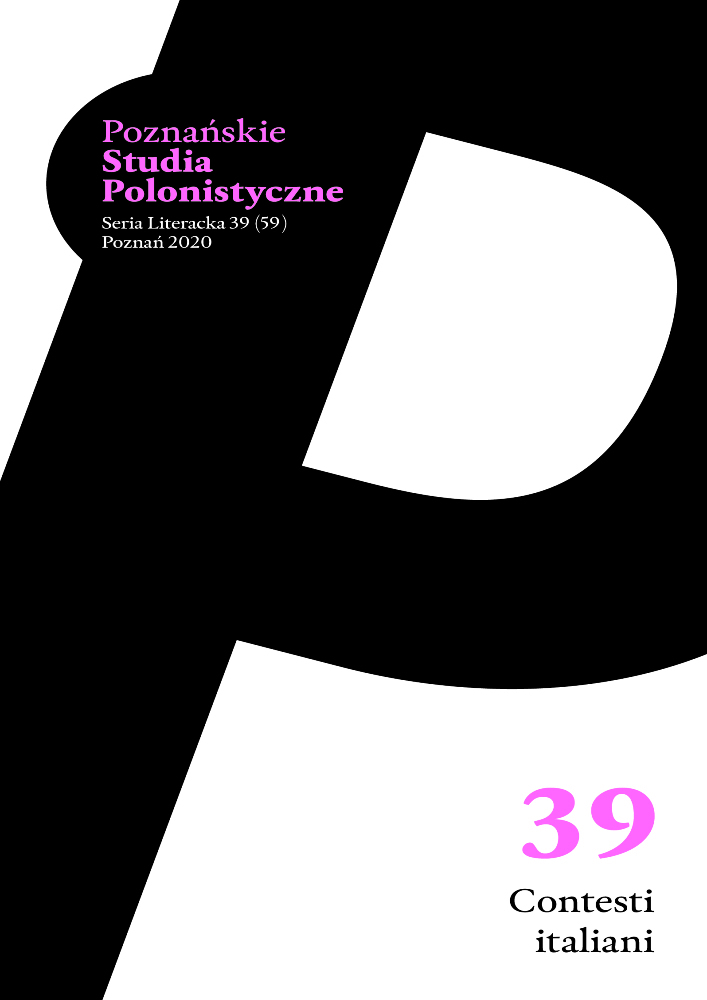Abstract
Like many other artists, Szymanowski was hugely attracted to Italy. In this article, I will briefly expose, firstly, the “Italian” tracks that can be found in the Polish composer’s music, and, secondly, the declarations on Italy in Szymanowski’s writings, in particular on his art and music, trying to relate these elements between them to see what image of Italian culture emerges. I will show how Szymanowski’s cultural environment remains German-based nevertheless looking for the lost unity between man, art and nature in the heritage of the Italian Renaissance.
References
Borkowska-Rychlewska Alina, Nowicka Elżbieta (2016), Opery Verdiego w polskich XIX-wiecznych przekładach, Poznańskie Towarzystwo Przyjaciół Nauk, Poznań.
Carapezza Paolo Emilio (1980), Re Ruggero tra Dioniso e Apollo, “Storia dell’arte”, n. 38/40, pp. 471-479.
Carapezza Paolo Emilio (1984), “Hagith” between Tosca and Salomé, in: Karol Szymanowski in seiner Zeit, herausgegeben von Michał
Bristiger, Roger Scruton, Petra Weber-Bockholdt, Wilhelm Fink Verlag, Munchen, pp. 127-135.
Cheng Ya-Hui (2008), The Harmonic Representation of the Feminine in Puccini, Florida State University.
Chodkowski Andrzej (1994), Verdi na scenie warszawskiej, in: Recepcja wzorów włoskich w polskiej kulturze muzycznej: romantyzm, a cura di Piotr Maculewicz, Instytut Muzykologii UW, Warszawa.
Chylińska Teresa (2008), Karol Szymanowski i jego epoka, vol. 1, PWM, Kraków.
Clément Catherine (1979), L’opéra, ou, la défaite des femmes, Grasset&Fasquelle, Paris [ed. ingl., 1988, Opera, or the Undoing of Women, Minnesota, University of Minnesota Press].
Dąbrowski Bartosz (2009), Szymanowski. Muzyka jako autobiografia, słowo/obraz terytoria, Gdańsk.
Dotto Aldo (2014), Le “Maschere” di Karol Szymanowski, ETS, Pisa.
Downes Stephen (1996), Szymanowski and Narcissism, “Journal of the Royal Musical Association”, n. 1 (121), pp. 58-81.
Gavazzeni Gian Andrea (1937), Karol Szymanowski e il “Re Ruggiero”, “Rassegna musicale”, X, n. 12, pp. 409-415.
Horowicz Bronisław (1963), Teatr operowy, PIW, Warszawa.
Isotta Paolo (2015), Altricanti di Marte, Marsilio, Venezia.
Lisecka Małgorzata (2018), Narcyz Szymanowskiego – reinterpretacja mitu w muzycznej narracji, “Litteraria Coperinacana”, n. 4 (28), pp. 79-95.
Martinisi Alessandro (2009), Il sogno sognato di Karol Szymanowski. Re Ruggero tra luce e ombra, pref. di Alberto Cesare Ambesi, Quintessenza Editrice, Gallarate.
Masi Leonardo, Il “Re Ruggero” di Szymanowski-Iwaszkiewicz: la genesi e le tematiche, “Europa Orientalis”, n. 20/2, pp. 111-147.
Rubinstein Arthur (1973), My young years, Alfred A. Knopf, New York.
Salvetti Guido (2013), «Ho detto male di... Verdi». Saggio di ricezione negativa, “Rivista Italiana di Musicologia”, n. 48, pp. 105-141.
Samson Jim (1980), The Music of Szymanowski, Kahn & Averill, London.
Smoter Jerzy Maria (1974), Karol Szymanowski we wspomnieniach, PWM, Kraków.
Szymanowski Karol (1982), Korespondencja, vol. 1 (1903-1919), PWM, Kraków.
Szymanowski Karol (1984), Pisma, vol. 1: pisma muzyczne, red. Kornel Michałowski, PWM, Kraków.
Szymanowski Karol (1989), Pisma, vol. 2: pisma literackie, zebrała i opracowała Teresa Chylińska, PWM, Kraków.
Szymanowski Karol (2018), Écrits sur la musique, a cura di Christophe Jerewski e Claude-Henry du Bord, Symétrie, Lyon.
Tagg Philip (2013), Music’s Meanings, The Mass Media Music Scholars’ Press, New York&Huddersfield.
Van Moere Didier (2008), Karol Szymanowski, Fayard, Paris.
Yoshida Shinobu (2012), Modeling Heroines from Giacomo Puccini’s Operas, University of Michigan, Michigan.
License
Authors
Authors of texts accepted for publication in „Poznańskie Studia Polonistyczne. Seria Literacka” are required to complete, sign and return to the editor's office the Agreement for granting a royalty-free license to works with a commitment to grant a CC sub-license.
Under the agreement, the authors of texts published in „Poznańskie Studia Polonistyczne. Seria Literacka” grant the Adam Mickiewicz University in Poznań a non-exclusive, royalty-free license and authorize the use of Attribution-NoDerivatives 4.0 International (CC BY-ND 4.0)Creative Commons sub-license.
The authors retain the right to continue the free disposal of the work.
Users
Interested Internet users are entitled to use works published in „Poznańskie Studia Polonistyczne. Seria Literacka” since 2016, for non-commercial purposes only, under the following conditions:
- attribution - obligation to provide, together with the distributed work, information about the authorship, title, source (link to the original work, DOI) and the license itself.
- no derivatives - the work must be preserved in its original form, without the author's consent it is not possible to distribute the modified work, such as translations, publications, etc.
Copyrights are reserved for all texts published before 2016.
Miscellaneous
Adam Mickiewicz University in Poznań retains the right to magazines as a whole (layout, graphic form, title, cover design, logo etc.).
